PhD Student
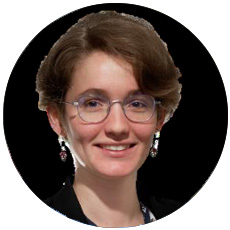
Sibylle Duval--Dachary joined the Economics and Environmental Evaluation Department of IFP Energies nouvelles in September 2021 to start her PhD work on the topic entitled "Negative emissions potential from CCU technologies".
She gratudated from Ecole des Mines de Nancy and has already 1.5 years of professional experience in the Life Cycle Asessment of biofuels and of Hydrogen fuel cells and electrolysers.
Her PhD research work will be supervised by Sandra Beauchet and Daphné Lorne (IFPEN) and Amandine Pastor and Thibault Salou (INRAE - Montpellier SupAgro) under the direction of Dr. Arnaud Hélias (INRAE - Montpellier SupAgro).
Negative emissions potential from CCU technologies
|
Image
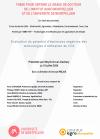
|
Evaluation du potentiel d'émissions négatives des technologies d'utilisation du CO2 |
Id. card:
Project Type: Doctoral project proposed at IFPEN in the frame of the CarMa IFP School Chair
Duration: 3 years, starting on sept. 2021
Ideal profile for the candidate: an enthusiastic, creative and communicative candidate with a degree in Process Engineering, Agronomy or Green Chemistry. The candidate should have theoretical and practical knowledge in LCA, and a strong interest in performing scientific research on negative emissions and climate change modeling. All applicants must send for selection a cover letter with their motivations and a CV.
Supervisors: Sandra Beauchet (IFPEN) and Dr. Arnaud Helias (INRAE)
Background
The consequence of human activities since industrial revolution is a 130 ppm increase in atmospheric concentration of CO2. Almost all nations are committed to limiting global warming to less than 2 °C from pre-industrial levels. However, most prospective scenarios highlight that the CO2 concentration in the atmosphere would have to stop increasing by the middle of this century to have a chance of limiting the global warming to 2°C. In that objective, more and more countries and companies target to be climate neutral by 2050. Therefore, reducing greenhouse gas emissions is an absolute priority, combined with negative emissions when needed. Such negative emissions rely on Negative Emissions Technologies (NETs), which are technologies that remove carbon from the atmosphere and sequester it. NETs cover both biological processes, such as terrestrial carbon sequestration, and industrial processes, like CO2 mineralization or Direct Air Carbon Capture and Sequestration (DACCS). Depending on the implemented technology, environmental impacts are likely to occur and have to be assessed to have a global overview of the pros and the cons of the different CO2 removal options. Life Cycle Assessment (LCA) is a methodology that assesses “the environmental impact of a system, including all activities associated with this system, from the extraction of raw materials through to its disposal and the treatment of its waste”. The holistic assessment of each life cycle step enables identifying hotspots and thus avoids problem shifting along the supply chains and between the different impacts assessed.
Scope of work
The objective of this PhD thesis subject is to assess the environmental benefits of different Carbon Capture and Use (CCU) technologies associated with end of life with carbon storage in the soil. In addition, multiple use of the carbon once it has been firstly captured will be considered. Therefore by associating biogenic carbon capture with different use technologies having different end of lives, different level of negative emissions can be achieve. To better represent this climate mitigation potential, it could be important to integrate temporal dimension in LCA. Temporal variations of commodity flows and emissions are in most cases ignored in current LCA practice although they are sometimes regarded as an important source of uncertainty (Beloin-Saint-Pierre et al. 2020, Collet et al. 2014). For carbon storage in soil, taking into account the dynamic is essential to properly assess potential climate benefits (Goglio et al. 2015, Albers et al. 2019a). For environmental assessment of CCU technologies, dynamic effects, such as process improvements or modifications of the utilities’ compositions, as well as the evolving nature of the reference systems, will also have to be considered. In addition, cascading, i.e. the use of the same unit of a resource (here captured biogenic CO2) in multiple successional applications, will also be considered. In this approach, resource utilization is optimized through sequential uses, with an extension of the life time of the resources mobilization, linked to gradual degradation of its quality grade.
The integration of dynamic both at the CCU technologies level (technologies evolution as well as cascading effect) and also at the end of life level (carbon sequestration in soil) will allow the creation of LCIs with a temporal distribution of the emissions and consumptions all along the life cycle of the products. These time-distributed LCI can therefore be coupled with dynamic LCIA methods in order to have a full dynamic LCA for different prospective scenarios (Albers et al. 2019b). Recent publications underline the relevance of considering dynamic when assessing climate change effects of biogenic carbon flows (Cherubini et al. 2016, Levasseur et al. 2016). This PhD work aims at developing new ways to integrate biogenic carbon flows when assessing negative emissions linked with CCU technologies and soil carbon sequestration, with a special attention on the multiple end of lives that will be assessed at each cascading levels (open loop recycling, close loop recycling, soil carbon sequestration, combustion…).
References:
Albers A, Avadí A, Benoist A, Collet P, Hélias A (2019a) Modelling dynamic soil organic carbon flows of annual and perennial energy crops to inform energy-transport policy scenarios in France. The Science of the total environment:135278. doi:10.1016/j.scitotenv.2019.135278
Albers A, Collet P, Benoist A, Hélias A (2019b) Back to the future. Dynamic full carbon accounting applied to prospective bioenergy scenarios. Int J Life Cycle Assess 25354(5952):1. doi:10.1007/s11367-019-01695-7
Beloin-saint-pierre D, Albers A, Hélias A, Tiruta-Barna L, Fantke P, Levasseur A, Benetto E, Benoist A, Collet P (2020) Addressing temporal considerations in life cycle assessment. Science of The Total Environment:140700. doi:10.1016/j.scitotenv.2020.140700
Cherubini F, Fuglestvedt J, Gasser T, Reisinger A, Cavalett O, Huijbregts MAJ, Johansson DJA, Jørgensen SV, Raugei M, Schivley G, Strømman AH, Tanaka K, Levasseur A (2016) Bridging the gap between impact assessment methods and climate science. Environmental Science & Policy 64:129–140. doi:10.1016/j.envsci.2016.06.019
Collet P, Lardon L, Steyer JP, Hélias A (2014) How to take time into account in the inventory step: A selective introduction based on sensitivity analysis. International Journal of Life Cycle Assessment 19(2):320–330. doi:10.1007/s11367-013-0636-7
Goglio P, Smith WN, Grant BB, Desjardins RL, McConkey BG, Campbell Ca, Nemecek T (2015) Accounting for soil carbon changes in agricultural life cycle assessment (LCA): a review. Journal of Cleaner Production 104:23–39. doi:10.1016/j.jclepro.2015.05.040
Levasseur A, Cavalett O, Fuglestvedt JS, Gasser T, Johansson DJA, Jørgensen SV, Raugei M, Reisinger A, Schivley G, Strømman A, Tanaka K, Cherubini F (2016) Enhancing life cycle impact assessment from climate science. Review of recent findings and recommendations for application to LCA. Ecological Indicators 71:163–174. doi:10.1016/j.ecolind.2016.06.049
Communications in conferences and seminars:
slides available on request from sibylle.duval-dachary@ifpen.fr
- TEcX conference, 23 September 2022, TotalEnergies, La Défense, France:
- poster: Duval-Dachary S., Assessing the negative emission potential of CCU with LCA.
Document
- poster: Duval-Dachary S., Assessing the negative emission potential of CCU with LCA.
- 16th International Conference on Greenhouse Gas Control Technologies GHGT-16, 23-27 October 2022, Lyon, France:
- platform presentation: Duval-Dachary S., Pastor A., Beauchet S., Lorne D., Salou T and Helias A., Life Cycle Assessment of BECCS systems: critical review of life cycle inventories. https://dx.doi.org/10.2139/ssrn.4271614
- SETAC Europe 33rd annual meeting, 30 April - 4 May 2023, Dublin, Ireland:
- platform presentation: Duval-Dachary S., Pastor A., Beauchet S., Lorne D., Salou T and Helias A., A guideline for life cycle assessment of carbon capture and utilization as negative emissions technologies.
Document
- plateform presentation: Duval-Dachary S., Pastor A., Beauchet S., Lorne D., Salou T and Helias A., LCA of biogenic carbon capture & storage processes : review of life cycle inventories and recommendations.
Document
- platform presentation: Duval-Dachary S., Pastor A., Beauchet S., Lorne D., Salou T and Helias A., A guideline for life cycle assessment of carbon capture and utilization as negative emissions technologies.
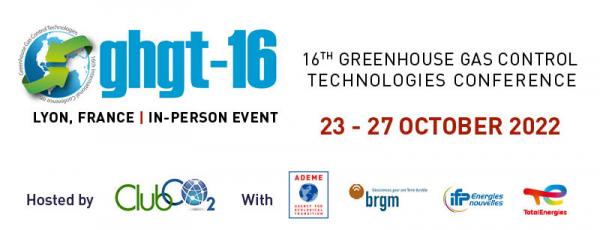
CarMa at GHGT16 next October in Lyon, France
The CarMa research team will be present at GHGT16 with up to 4 communications
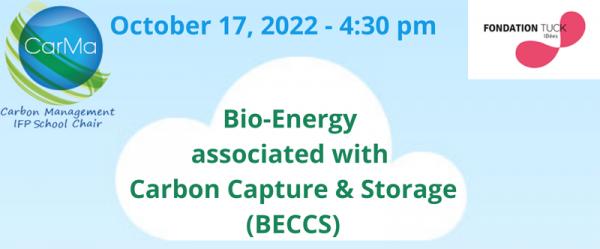
October 17, 2022 4:30 - 7 pm: CarMa Online Conference at Fondation Tuck
CarMa is pleased to share on its ongoing research activity

CarMa research results presented at the TEcX workshop (September 13, 2022)
Poster: Assessing the negative emission potential of CCU with LCA
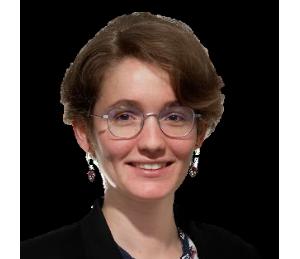
New CarMa PhD student arrival at IFPEN on LCA in the domain of BECCS
September 3, 2021



